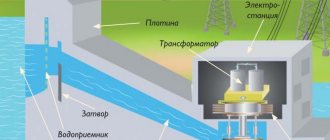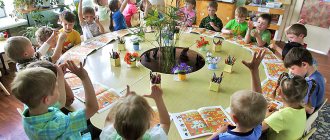Conversation with elements of discussion: “Ecology and us”
Conversation with elements of discussion: “Ecology and us”
Target:
contribute to the formation of a holistic perception of the world in children, promote love and a caring attitude towards nature.
Tasks:
- Introduce children to the concept of “ecology”;
- Expand and enrich knowledge about nature, its phenomena, rules of conduct in it;
- Expand children's ideas about the rational interaction of man with nature;
- Foster a caring attitude towards nature, its resources, flora and fauna.
Progress of the conversation
"Man must decorate the earth"
M.A. Sholokhov
“Happiness is being with nature, seeing it, talking to it”
L.N. Tolstoy
Introductory speech by the teacher
Everything that surrounds us is nature: the sky, forest, river, sun, trees, flowers, grass, birds, animals, insects, people, all this is nature. Everything that exists in nature must exist together, side by side, amicably. Thus, trees cannot live without sun, water, and without birds, which find and eat worms in the bark of trees. Animals also cannot live without water, solar heat and light, without the grass they eat, without trees that protect them from heat and rain. All living beings in nature depend on each other. So, you've probably heard the word ecology. What do you think ecology is?
ECOLOGY is a science that studies the relationships between plants, animals, humans and their connection with inanimate nature: the sun, water, air. Ecology still studies how humans influence nature. He can influence well, i.e. help nature. It can influence badly, i.e. harm nature, spoil, destroy it.
Give examples of how people help nature. (Children answer). That's right, a person plants trees, takes care of plants and animals, feeds birds. How can a person harm nature? (Children answer).
Yes, of course, a person can cut down trees, destroy animals, throw out garbage, pollute the air with smoke and car exhaust fumes. We humans pollute and destroy nature, and almost every schoolchild, unfortunately, also pollutes nature. Surely, some of you have thrown plastic bags, candy wrappers, and plastic bottles into the street, into a ditch, or into the bushes. Is it possible to do this? Of course not! Firstly, it is simply ugly, and secondly, it destroys nature. But if you still have any garbage left, do not throw it into the ditch, collect it and take it to the trash container. This garbage will be taken to specially equipped places, where it will be processed, and it will no longer cause enormous harm to the environment. Scientists are working to create systems for recycling and recycling waste. Ordinary people help them.
Today nature is experiencing considerable upheaval. The words most often heard are: unfavorable ecology, ecological crisis, environmental disaster. Yes, the development of science and technology requires huge amounts of coal, ore, oil and wood. More and more land is being plowed up for the development of agriculture. When constructing hydroelectric power stations, dams are built, river beds are changed, and large areas are flooded. We get light, gas, heat, but at the same time we destroy thousands of animals and plants!
Ecology is the science of our common home.
Questions for children and expected answers:
How do people pollute nature?
(Garbage, exhaust gases, industrial waste);
Where does household waste go from apartments and houses?
(They take the garbage cars to the landfill);
What happens to the garbage at the landfill?
(Rots, decomposes, emits terrible odors, gathers hordes of rodents, its number is growing);
How to reduce landfills?
(Buy less unnecessary things, sort garbage, recycle paper, glass, compost food waste);
What can be made from waste paper and glass?
(New paper, glass products);
What other types of waste are there?
(Metal, construction, plastic);
What can you do with them?
(Recycle and reuse);
What do you kids throw in the trash?
(Candy wrappers, broken and old toys);
How to reduce the amount of waste?
(Donate unnecessary toys to charity, try to fix broken ones and reuse them, sort other garbage);
Why do we need waste recycling plants?
(To recycle and reduce waste).
Game "Take care of nature"
Pictures depicting plants, birds, animals, humans, the sun, water, clouds, rivers, forests, etc. are laid out on the table. The teacher removes one of the pictures, and the children must tell what will happen to the remaining living objects if there is no hidden object on Earth. For example: if he removes a bird, what will happen to the rest of the animals, to humans, to plants, etc.
Summarizing
The message of our event: “Alone we can do little. Together we can save the planet! We have only one land – there will never be another!”
I propose to take the oath of a young ecologist and be faithful to it throughout life:
“I, a man, swear to love and take care of the surrounding nature: not to light a fire in the forest, not to disturb the peace of the forest inhabitants; do not destroy bird nests and anthills; Don’t treat animals cruelly, don’t remain indifferent if you see someone harming nature!”
Let's develop the following rules and stick to them:
- Make bird feeders from plastic or Tetra Pak bags.
- Garbage sorting.
- Collect waste paper and hand it over.
- Collect garbage.
- Buy a reusable bag for the store.
- Plant trees and more!
- Communicate with living nature.
- Feed any living creatures.


